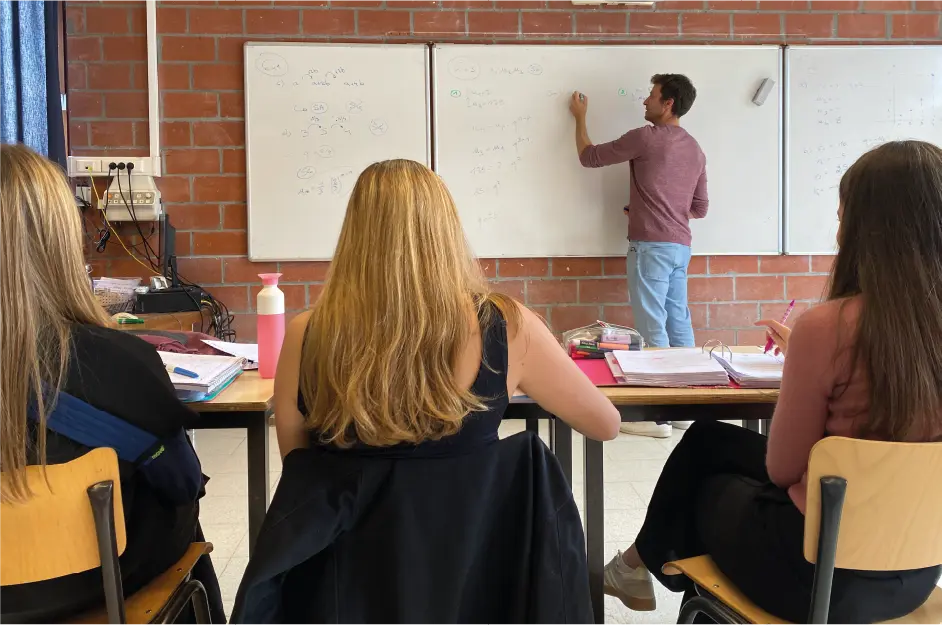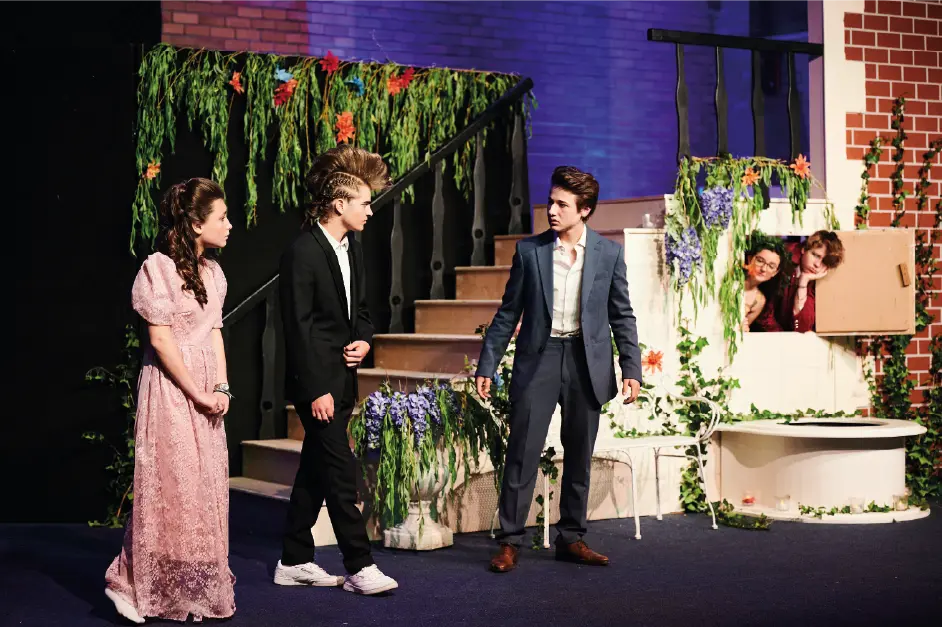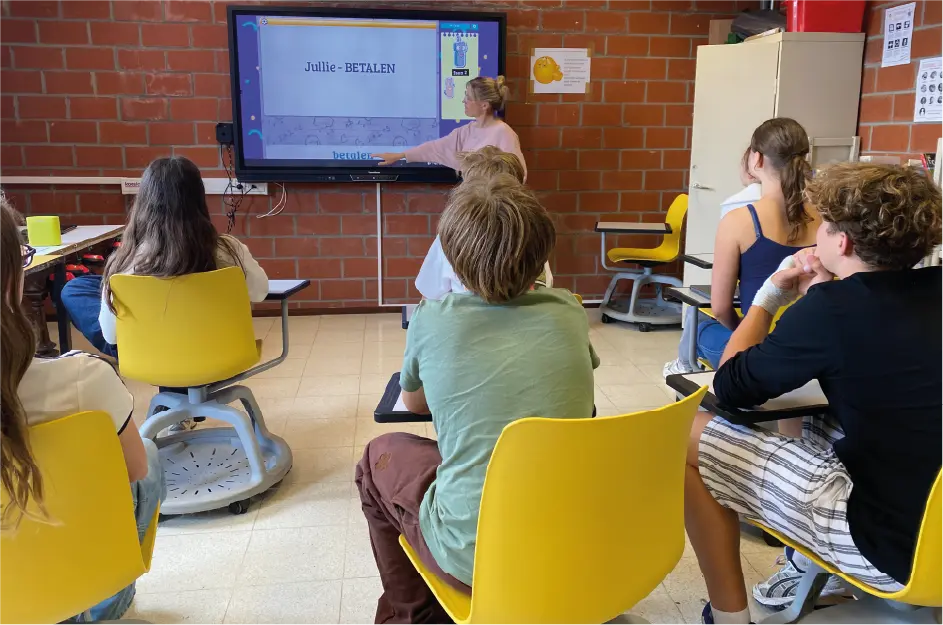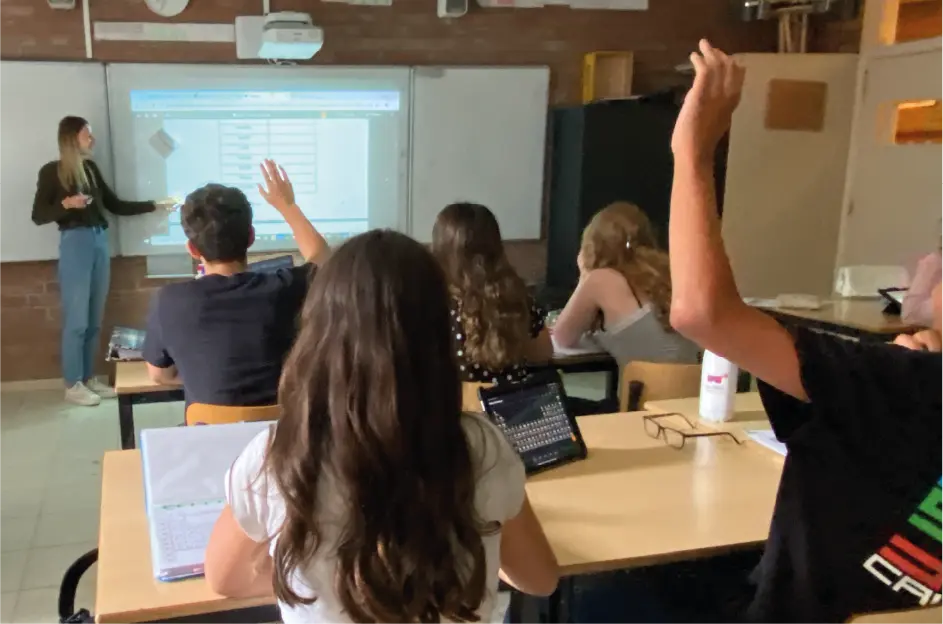
How we do it
How we do it
Growing in confidence & building resilience
At our Secondary School, we believe in a holistic approach to education that goes beyond academics to support the personal growth and development of every student. Here’s how we achieve this:
- Strong Academic Foundation: We provide a rigorous curriculum designed to challenge students and build a solid academic foundation that prepares them for future success.
- Language Learning: Dutch is the main language taught within the official school curriculum with the possibility of adding German and Spanish.
- Individualized Support: Whilst emphasising the importance of a collective approach to learning, teachers take account of pupils’ individual needs, ensuring they have the resources to do their best.
- Extra-Curricular Activities: We offer a wide range of extra-curricular activities, allowing students to explore new interests, discover talents, and engage in creative and physical pursuits. These activities play an essential role in their overall development. English learning takes place through our excellent extra-curricular provision, including preparation for internationally recognised examinations giving access to universities throughout the world.
- Specialized Programs:
- Mini-Enterprise Programme: A prestigious initiative that teaches entrepreneurship and culminates in a national competition, helping students develop real-world business skills.
- Duke of Edinburgh International Award: This globally recognized program encourages personal growth through social contribution and skill-building activities, fostering well-rounded global citizens.
- Guidance and Support for the Future: We are committed to helping students prepare for life after school. Our dedicated guidance and coaching services provide support with career exploration and university applications, including assistance with international institutions.
By offering this comprehensive approach, we ensure that students leave our school not only with strong academic achievements but also with the confidence, skills, and experiences needed to thrive in a fast-changing world.




Interculturality, an essential value
Interculturality is one of our school’s core values. By interculturality, we mean sharing life experiences with one or more people from another culture. We encourage our students to listen to others and engage in dialogue, thereby strengthening their personal identity and appreciation of the world’s diversity. With around forty nationalities represented within the school, we are well placed to awaken curiosity and open-mindedness in our young people. In addition, we offer programmes and activities that help to educate our students as citizens in a globalised world.
- Erasmus+ accreditation: The secondary school is accredited to organise short- and long-term exchange and mobility activities (between one week and six months) for students and staff, funded by the European Union.
- Exchanges: Our students who are learning French as a Foreign Language or Learning Language (FLE/FLA) visited a school in France with our eco-delegates to practise the language, learn more about the culture and exchange ideas on eco-friendly measures to be implemented in both schools.
- 3-6 month mobility: Every year, students in Years 4 and 5 are selected to live with a host family and study at a school in another European country. Recently, our students have been welcomed in the Czech Republic, Slovakia, Poland, Turkey, France, Spain, Italy and Iceland. This very enriching experience is organised with the help of our partner AFS.
- Training and job shadowing for staff members: Spending a week observing classes and interacting with colleagues in another European country enriches our staff’s professional practices and helps them better understand the situation experienced by their students when they go abroad or arrive at Le Verseau without speaking French fluently.
- European Parliament Ambassador School: The Secondary section of Le Verseau is recognised as an Expert School as part of the European Parliament Ambassador School Programme.
The European Parliament Ambassador School Programme (EPAS) aims at increasing students’ awareness of European parliamentary democracy, the role of the European Parliament and European values. It also encourages them to actively participate in EU democratic processes. - Jan Comenius Prize: Le Verseau Secondary School was proud to be selected in 2020 as the Belgian school which received this prestigious award from the European Commission for high quality teaching about the European Union.
Other intercultural experiences
- Exchange with Flemish pen pals in Year 6: As part of their Dutch lessons, our Year 6 pupils get to know their peers on the other side of the language border. Differences and similarities are explored through virtual contact and during meeting days organised around preparations for university studies. These take place in university towns that are emblematic of the community issue in Belgium, Leuven and Louvain-la-Neuve, but Brussels, as the capital of Europe, also offers unique opportunities. For several years, our exchange has benefited from the support of the Prince Philippe Fund in recognition of its intercultural added value.
- School trips and excursions in Flanders and the Netherlands: School trips and excursions organised as part of the Dutch language course introduce students to the sounds and sights of historic cities in Flanders and the Netherlands. Students visit cultural masterpieces, interview passers-by and sample local delicacies at the market. The aim is to awaken students’ appreciation for the richness of Dutch-speaking culture and to reflect on its links with the past.
- The Year 5 visit to Ypres: In Year 5, students visit the cemeteries where soldiers from various countries (Germany, Belgium, France, the United Kingdom and its empire) who fought in the First World War are buried, and pass by the Menin Gate, on which are engraved the names of 55,000 British soldiers – and those from the empire – who went missing in action. The students learn about the sacrifice made by soldiers who came from countries so far away from the fields of Flanders, such as Canada and Australia.
- Dutch and German Weeks: Fun activities, competitions, songs and culinary specialities are on the menu during these weeks dedicated to the respective languages, organised around different themes.
- German lessons: During the past school year, several activities allowed students taking German to discover and experience German-speaking culture.
- Visit to Aachen: a cultural and linguistic trip: As part of their German course, students took part in a school trip to Aachen, an imperial city with a remarkable historical heritage. This one-day immersion allowed them to explore iconic sites such as the Dom, the Couven Museum with its 18th-century architecture and furniture, and the Charlemagne Centre, dedicated to the history of the city and Charlemagne. Fun activities, such as a quiz on local legends and an interactive exchange game called “An Apple and an Egg,” allowed the students to practise their German by interacting with the locals. The aim of this outing was to offer an authentic immersion in the German language and culture.
- Invitation to the embassy: conference on the legacy of the Holocaust. The students were also invited by the German Embassy in Belgium to a conference on the legacy of the Holocaust, entitled “How can we prevent forgetting and pass on the memory to younger generations?”. On the 80th anniversary of the liberation of the Auschwitz-Birkenau camp, this meeting gave them an opportunity to reflect deeply on the crucial role of survivors and their descendants in passing on individual and collective memories. The students thus became aware of the importance of preserving these testimonies, not only to combat forgetting, but also to encourage civic responsibility in the face of discrimination.
- Cultural immersion in the classroom: In addition to these outings, throughout the school year, the German course offers students cultural immersion in the classroom. They discover not only the German language, but also the history and geography of Germany and Austria, as well as their traditions, folklore, music and culinary specialities. The course is intended to be a gateway to German-speaking culture.
The next steps
At Le Verseau, we provide every student with personalised guidance as they prepare for higher education. Our students graduate with a globally recognised diploma and are well-equipped for success in Belgium or abroad, thanks to strong academic foundations, language skills, and a wide range of enriching opportunities. From support with university applications to optional programmes in English and entrepreneurship, we help students discover the path that best fits their ambitions.
